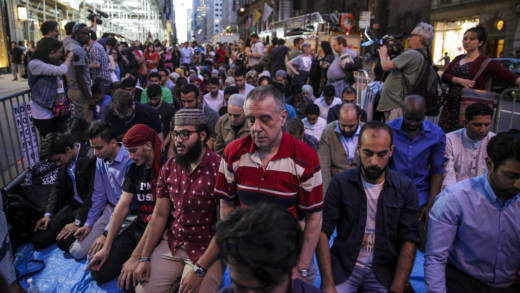The 9th Circuit Court of Appeals heard arguments in the administration's request for a stay pending appeal to lift the Hawaii injunction on May 15, but it has not yet ruled.
Trump and the Justice Department are asking the Supreme Court to review the case in the 4th Circuit, and to place stays on the injunctions that resulted from both cases. The administration made three separate filings with a total of more than 880 pages late Thursday.
The executive order was issued in early March. It "suspends for 90 days the entry of foreign nationals from six countries that sponsor or shelter terrorism (Iran, Libya, Somalia, Sudan, Syria, and Yemen)," the White House says in its Supreme Court filing.
In a statement about the new filing, Justice Department spokeswoman Sarah Isgur Flores said:
"We have asked the Supreme Court to hear this important case and are confident that President Trump's executive order is well within his lawful authority to keep the nation safe and protect our communities from terrorism. The president is not required to admit people from countries that sponsor or shelter terrorism, until he determines that they can be properly vetted and do not pose a security risk to the United States."
Trump's executive order calls for a "worldwide review" of the visa process to take place during the three months of the travel ban. It would also suspend the U.S. Refugee Admission Program for 120 days and lower the maximum number of refugees who can enter the U.S. in 2017.
The two cases in question are similar in that both of them sought to block the travel ban — but the Hawaii case also resulted in the court blocking the Trump administration's plan to suspend the Refugee Admission Program and cut the number of refugees.
In its Supreme Court filing, the Justice Department complains, "Respondents barely mentioned any of these provisions in seeking to restrain the Order."
The contested executive order is a revised version of Trump's first attempt at a travel ban, which was issued in his first week in office — and which sparked a lawsuit led by Washington state. The temporary travel ban created chaos at airports both in the United States and abroad, as officials grappled with ambiguous instructions on whether and whom to admit to the country.
A U.S. District Court judge in Seattle blocked the executive order. The U.S. Justice Department appealed to the 9th Circuit, which upheld the lower court's injunction.
After first pledging to take the case to the U.S. Supreme Court, the president issued a revised executive order on March 6, in an effort to address objections raised by the Seattle judge.
The revised order appeared in the Federal Register on March 9 and was blocked by judges in Hawaii and Maryland.
Copyright 2017 NPR. To see more, visit http://www.npr.org/.
9(MDAxOTAwOTE4MDEyMTkxMDAzNjczZDljZA004))

9(MDAxOTAwOTE4MDEyMTkxMDAzNjczZDljZA004))
